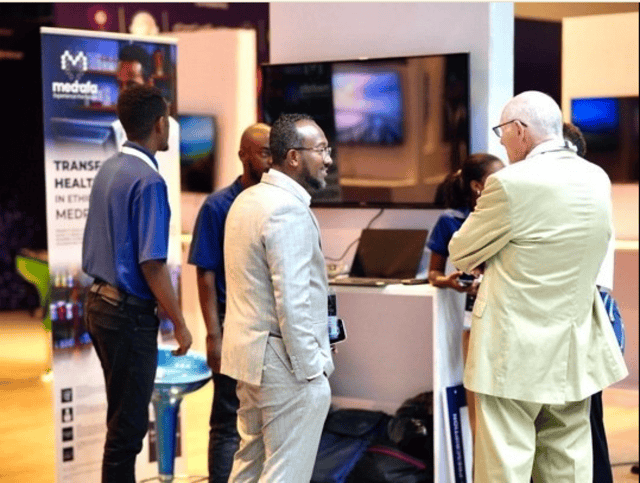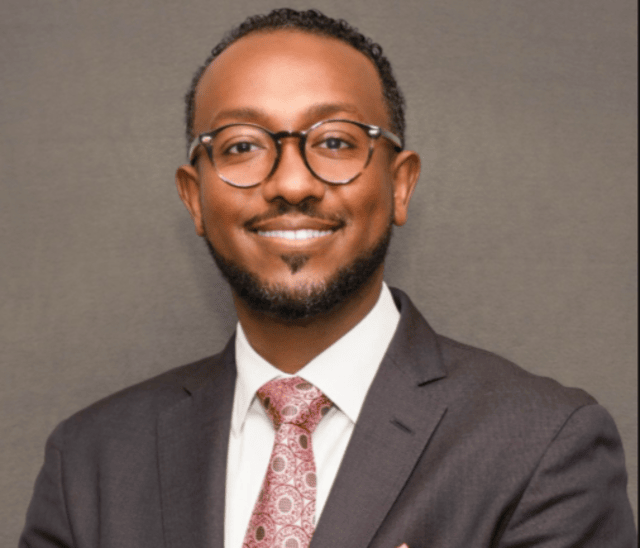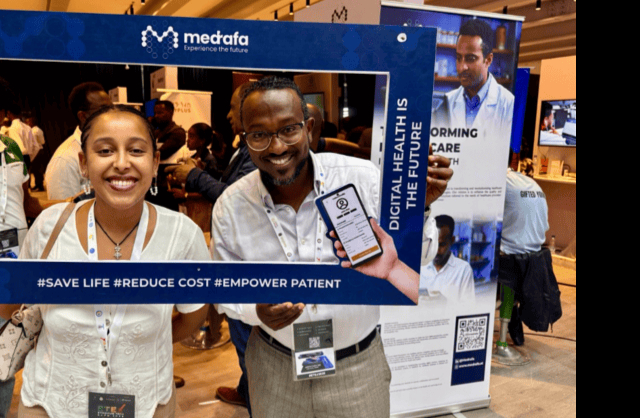Medrafa team at Ethiopia’s inaugural National Technology Expo (ETEX 2025), showcasing their digital health solutions. (Courtesy photo)
Tadias Magazine
By Tadias Staff
Updated: June 13th, 2025
TADIAS – At Ethiopia’s inaugural national technology expo, ETEX 2025, a bold new name in health-tech made its presence known: Medrafa, a homegrown digital health company founded by Ethiopian Americans, is reshaping how prescriptions are written, filled, and managed across the country.
Co-founded by Ben Tesfaye, Managing Partner at USP Holdings in Washington, D.C., Medrafa is on a mission to save lives by eliminating prescription errors, optimizing pharmacy operations, and giving patients more control over their medical data.
“We didn’t build this for tomorrow,” Ben tells Tadias. “We built it for today—for real-world problems faced by people in Ethiopia right now.”
And the numbers speak for themselves: Over 50 pharmacies onboarded, more than 150 healthcare professionals trained, and 52,000+ prescriptions processed since its launch last year. It’s not just an idea—it’s already changing lives.
Built for Ethiopia, Designed for Africa

Co-founder Ben Tesfaye and Medrafa team at Ethiopia’s inaugural National Technology Expo (ETEX 2025), showcasing their digital health solutions. (Courtesy photo)
What sets Medrafa apart is its combination of cutting-edge technology and local grounding. The system uses internationally recognized health data standards like SNOMED CT and FHIR, ensuring global interoperability, while being entirely developed in Ethiopia by a team of engineers and health professionals who understand the local context.
Its AI-powered e-prescription platform ensures that prescriptions are legible, secure, and compliant—eliminating errors that often occur with handwritten scripts. Meanwhile, the inventory management system empowers pharmacies to reduce waste, avoid expired drugs, and forecast demand accurately—helping to lower medication costs across the board.
Just as transformative is Medrafa’s patient-centered approach: for the first time in Ethiopia, individuals can track their prescriptions, access their medical history, and safeguard against harmful drug interactions—all through a secure digital platform.
A Sustainable, Scalable Model
Unlike many private tech solutions, Medrafa’s software is free for all pharmacies, clinics, and hospitals, with sustainability built into a modest per-transaction fee model. A portion of revenues is earmarked to support vulnerable patients who can’t afford medication—fusing innovation with inclusion.
“Digital equity is healthcare equity,” Ben emphasizes. “Everyone deserves access to safe, affordable treatment—no matter their income or ZIP code.”
As Ethiopia navigates rapid urban growth and a rising demand for efficient, trustworthy healthcare systems, Medrafa is providing more than a product—it’s offering a model for the continent.
What’s Next
With a successful showing at ETEX 2025 behind them and growing recognition from local and international media—including Addis Fortune—Medrafa is gearing up for nationwide expansion and regional partnerships.
“We’re just getting started,” Ben says. “This isn’t about disruption for the sake of it. It’s about building something that lasts.”
Q&A: A Conversation with Medrafa Co-Founder Ben Tesfaye

Ben Tesfaye, co-founder of Medrafa. (Courtesy photo)
Tadias spoke with Medrafa co-founder Ben Tesfaye to learn more about the company’s groundbreaking work, the team behind its success, and how their shared Ethiopian American background is shaping a bold new vision for digital health in Ethiopia and beyond.
TADIAS: Can you walk us through the origin story of Medrafa? What inspired you and your team to launch a health-tech company in Ethiopia?
Ben Tesfaye: Not many people know this, but after graduating with my bachelor’s degree, I was actually enrolled in pharmacy school. Life, however, took a different turn. I ended up joining my brothers in business, and that early dream of working in pharmaceuticals slowly faded away.
Fast forward nearly 20 years—about two years ago—a close family member who studied computer science, along with one of their friends who is a medical doctor, pitched me an idea for an e-prescription system. I was intrigued by the concept and inspired by their ambition. But it quickly became clear they needed more than just funding; they needed guidance, structure, and someone who could help bring the vision to life.
For me, it was a full-circle moment. Medrafa gave me the chance to return to a field I had once been passionate about—this time with the experience, network, and perspective I’ve gained through my business journey. The problem we’re solving—digitizing prescriptions to improve safety, reduce cost, and empower patients in Ethiopia’s healthcare system—is deeply meaningful.
I often get asked what “Medrafa” means. “Med” stands for Medical, and “Rafa” means Healing.
TADIAS: Why did you choose to focus specifically on e-prescriptions and pharmacy systems?
Ben: That’s a great question. In Ethiopia, pharmacies are often the most accessible point of care, yet they remain some of the most underserved when it comes to digital infrastructure. E-prescriptions not only reduce medication errors—which currently stand at 58% in Ethiopia—they also help streamline supply chains, improve inventory management, and create a pathway for integration with insurance systems. We saw pharmacies as the most practical and impactful entry point for transforming the healthcare system from the ground up.
To make this vision a reality, we had to overcome the lack of robust inventory management systems. Medrafa has built three powerful tools:
An end-to-end pharmacy inventory management system, which handles workflow from purchase orders to digital payments with electronic receipts.
A prescription portal for doctors, which allows AI-supported prescribing while preventing drug-to-drug interactions—thanks to access to patient data for both doctor and patient.
The RX Hub, where we envision all prescriptions integrating into a nationalized system.
We studied the two primary global models: the U.S., where e-prescriptions are led by the private sector, and Europe, where governments lead the effort. Our RX Hub is a hybrid of these approaches. We believe Africa, as a latecomer, has the advantage of learning from these systems and leapfrogging ahead through innovation.
TADIAS: Medrafa is unique in that it was built locally, yet adheres to global health-tech standards. Why was that important?
Ben: I believe Ethiopia—and Africa as a whole—shouldn’t have to choose between innovation and inclusion. By building Medrafa locally while aligning with global standards like SNOMED CT and FHIR, we’re ensuring our system can integrate with international platforms while staying grounded in local realities. Currently, Medrafa holds the first and only SNOMED CT license in Ethiopia’s private sector.
This approach future-proofs African healthcare and empowers local talent to lead the charge. One of the most inspiring parts of this journey has been working with incredibly dynamic and capable professionals right here in Ethiopia. The talent exists—we just need to invest in it and believe in it.
TADIAS: Your platform gives patients direct access to their medical data—how does this shift the healthcare experience in Ethiopia?
It’s truly a paradigm shift. Traditionally, patients in Ethiopia have been passive participants in their own care. With Medrafa, that changes. Patients are informed and empowered. They can access their prescriptions, track medications, and engage with their health records digitally.
This level of transparency builds trust. It leads to better adherence, improved outcomes, and stronger relationships between patients and providers. At the end of the day, we’re all patients—whether you’re a teacher, a minister, wealthy or poor, even a doctor. That’s why this platform matters. It’s for everyone.
TADIAS: Can you tell us more about your sustainability model and why you made the decision to offer the system free to providers?
Ben: Our goal was never just to build software. These days, building software is the easy part. What we set out to build was trust and ecosystem-wide impact. By offering Medrafa free to pharmacies and clinics, we eliminate cost as a barrier to digital transformation and adoption.
We sustain the platform through small transaction fees, strategic partnerships, enterprise services, and research collaborations. This is a long-term play. We’re investing in the public good now to build credibility, scale, and resilience for the future.
One of the biggest challenges in Ethiopia—and across Africa—is over-reliance on grants or imported foreign software. These systems often collapse when external funding ends or become unsustainable due to a lack of local support. Our timing proved critical: just as we launched Medrafa, several donor-funded platforms—backed by major organizations like USAID—were being dismantled. That moment reinforced our belief: sustainability must come from within. Locally built and maintained solutions aren’t just preferable—they’re essential.
TADIAS: How did your experience as an Ethiopian American entrepreneur and investor in the U.S. shape the way you approached this venture?
Ben: I’m incredibly grateful for what the U.S. has given me: the education, the exposure, and the opportunities to grow as an entrepreneur. It shaped who I am and taught me how to build, lead, and scale businesses. But more importantly, it gave me the mindset and means to give back.
As part of the Ethiopian diaspora, we’ve been blessed with access, resources, and perspective. With that comes a moral responsibility to contribute to our home country’s development. Medrafa isn’t just a business—it’s a way to bring that experience full circle. It’s about applying the lessons I’ve learned abroad to solve real, local problems in a meaningful and sustainable way.
TADIAS: What are some of the challenges you’ve faced—technical, regulatory, or cultural—in implementing Medrafa on the ground?
Ben: Interestingly, compared to other sectors I’ve worked in across Ethiopia, I’ve found digital health to be one of the least challenging in terms of development, implementation, and user acceptance. The real hurdle lies in regulation.
Digital health is still in its infancy here, and there are few clear guidelines—especially concerning patient data privacy. That said, I’ve been encouraged by the government’s openness to innovation and digital tools. The momentum is there, and the outlook is promising.
That’s why we’ve prioritized working closely with stakeholders to help shape policies transparently and responsibly. We want to create a foundation the entire health sector can build upon. We also call on others to join this effort. The private sector must play a leading role in transforming healthcare—but only if it’s given the trust and opportunity to do so.
TADIAS: With over 50 pharmacies already on board, what’s next for Medrafa? Are you planning to expand beyond Addis Ababa?
Ben: Absolutely. We’re already active in three regions across Ethiopia and are preparing to pilot the platform in clinics, with plans for broader regional rollout.
Our long-term vision is to build a complete digital health ecosystem. That includes integrating wholesalers with pharmacies, establishing a medical marketplace, syncing with insurance workflows, and connecting underserved rural areas.
We’ve designed Medrafa as a self-service platform, so anyone in any region can create an account and start using it—without needing our direct involvement. That’s central to our strategy for scalable growth.
TADIAS: What advice would you give to other members of the diaspora who want to build something meaningful in Ethiopia?
Ben: First, I truly believe those of us in the diaspora have a moral obligation to give back. We’ve been blessed with opportunity—and that comes with responsibility.
But I’d also say: come with clear eyes. Don’t view Ethiopia through a diaspora lens or become discouraged when things don’t move at the pace you’re used to. You’ll need thick skin and deep patience. More importantly, take time to understand the local mindset, rhythm, and realities.
If you can do that, the journey will be twice as fulfilling. Because you’re not just building a business—you’re helping shape a future. And there’s nothing more meaningful than that.
TADIAS: Looking ahead, how do you envision Medrafa’s role in the broader African digital health ecosystem?
Ben: We envision Medrafa evolving into one of Africa’s leading digital health platforms—and ultimately, a homegrown health-tech unicorn. That’s not just a dream—it’s a goal we’re actively working toward, supported by Ethiopia’s innovation ecosystem and government institutions that recognize the power of digital transformation in healthcare.
But we want to be more than just a tool. We want Medrafa to serve as a foundation—for interoperability, local innovation, and regional integration. By building standards-aligned infrastructure and collaborating with public and private sectors, we believe we can help shape a digital health future that is equitable, scalable, and uniquely African.
In the U.S. or Europe, it’s easy to pick up a prescription in one city and refill it in another. That seamlessness is taken for granted. I want to see a future where the same experience is possible across African borders—or even across oceans. That’s the future Medrafa is working to make real.
TADIAS: Thank you again, Ben, and best wishes from all of us at Tadias!
–
Learn more about Medrafa at medrafa.et. You can also connect with them on Facebook and LinkedIn.
Join the conversation on X and Facebook.
Crédito: Link de origem


